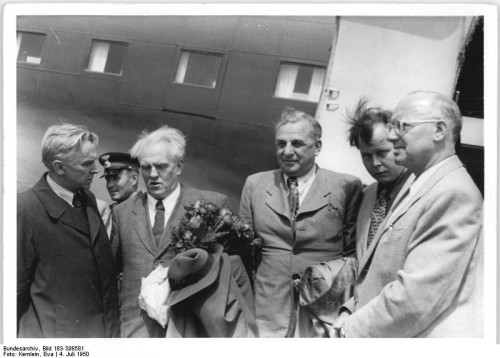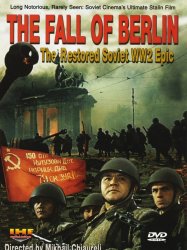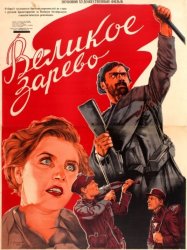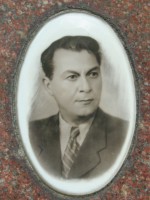Pyotr Pavlenko is a Scriptwriter born on 11 july 1899 at Saint Petersburg (Russie)

Pyotr Andreyevich Pavlenko (Russian: Пётр Андре́евич Павле́нко), (born July 11, 1899, in St. Petersburg; died June 16, 1951, in Moscow), was a Soviet writer, screenwriter and war correspondent. He became a member of the CPSU in 1920.
Pavlenko was born in St Petersburg where his father was an office worker. Pavlenko studied at the Baku Polytechnic in 1919/20. In 1920 he began political work in the Red Army and continued this work later in Transcaucasia.
Career
He was part of the Soviet trade delegation in Turkey from 1924 to 1927. Pavlenko began publishing his works in 1928. His first short stories and essays, among them the collections Asian Stories (1929) and Istanbul and Turkey (1930), dealt with the non-Soviet East.
Pavlenko's travels in the Soviet East in the early 1930s furnished him with material for reevaluating and overcoming the heritage of oriental romanticism, a literary manner characteristic of the Pereval (The Pass) group of writers, with which he was associated. His new approach was reflected in the novella The Desert (1931) and the book of essays Journey to Turkmenistan (1932). In the novel The Barricades (1932), which dealt with the Paris Commune of 1871, he attained the realistic technique he'd been working toward. Defense of the homeland is the central theme of the novel In the East (books 1–2, 1936–37; film title In the Far East, 1937, in collaboration with S. Radzinsky) and of the film script for Alexander Nevsky (1938, in collaboration with Sergei Eisenstein; State Prize of the USSR, 1941). Pavlenko also wrote the film script for Yakov Sverdlov (1940; in collaboration with B. M. Levin).
Pavlenko was a war correspondent during the Soviet-Finnish War of 1939–40 and World War 2. The novel Happiness (1947; State Prize of the USSR) was inspired by his experience during the restoration of the Crimea’s economy. The hero, the Communist Voropaev, is depicted comprehensively and in depth. In collaboration with Mikheil Chiaureli, Pavlenko wrote the scripts for the films The Vow (1946; State Prize of the USSR, 1947) and The Fall of Berlin (1949; State Prize of the USSR, 1950). He also wrote three books of essays, American Impressions (1949), Young Germany and Italian Impressions (both 1951). The novella Steppe Sunlight (1949) is clear and graphic in its language and well-defined in its aim. Pavlenko’s novel Toilers of the World (partly published in 1952) was unfinished.
Later life
Pavlenko was a deputy to the third convocation of the Supreme Soviet of the USSR. He was awarded the Order of Lenin, two other orders, and several medals. He died in 1951 in Moscow and was buried in the Novodevichy Cemetery.
Source : Wikidata
Pyotr Pavlenko

Birth 11 july 1899 at Saint Petersburg (Russie)
Death 16 june 1951 (at 51 years) at Moscow (Russie)
Awards Order of Lenin, State Stalin Prize, Order of the Red Banner
Death 16 june 1951 (at 51 years) at Moscow (Russie)
Awards Order of Lenin, State Stalin Prize, Order of the Red Banner
Biography
Early lifePavlenko was born in St Petersburg where his father was an office worker. Pavlenko studied at the Baku Polytechnic in 1919/20. In 1920 he began political work in the Red Army and continued this work later in Transcaucasia.
Career
He was part of the Soviet trade delegation in Turkey from 1924 to 1927. Pavlenko began publishing his works in 1928. His first short stories and essays, among them the collections Asian Stories (1929) and Istanbul and Turkey (1930), dealt with the non-Soviet East.
Pavlenko's travels in the Soviet East in the early 1930s furnished him with material for reevaluating and overcoming the heritage of oriental romanticism, a literary manner characteristic of the Pereval (The Pass) group of writers, with which he was associated. His new approach was reflected in the novella The Desert (1931) and the book of essays Journey to Turkmenistan (1932). In the novel The Barricades (1932), which dealt with the Paris Commune of 1871, he attained the realistic technique he'd been working toward. Defense of the homeland is the central theme of the novel In the East (books 1–2, 1936–37; film title In the Far East, 1937, in collaboration with S. Radzinsky) and of the film script for Alexander Nevsky (1938, in collaboration with Sergei Eisenstein; State Prize of the USSR, 1941). Pavlenko also wrote the film script for Yakov Sverdlov (1940; in collaboration with B. M. Levin).
Pavlenko was a war correspondent during the Soviet-Finnish War of 1939–40 and World War 2. The novel Happiness (1947; State Prize of the USSR) was inspired by his experience during the restoration of the Crimea’s economy. The hero, the Communist Voropaev, is depicted comprehensively and in depth. In collaboration with Mikheil Chiaureli, Pavlenko wrote the scripts for the films The Vow (1946; State Prize of the USSR, 1947) and The Fall of Berlin (1949; State Prize of the USSR, 1950). He also wrote three books of essays, American Impressions (1949), Young Germany and Italian Impressions (both 1951). The novella Steppe Sunlight (1949) is clear and graphic in its language and well-defined in its aim. Pavlenko’s novel Toilers of the World (partly published in 1952) was unfinished.
Later life
Pavlenko was a deputy to the third convocation of the Supreme Soviet of the USSR. He was awarded the Order of Lenin, two other orders, and several medals. He died in 1951 in Moscow and was buried in the Novodevichy Cemetery.
Usually with
Filmography of Pyotr Pavlenko (4 films)
Scriptwriter

The Fall of Berlin (1950)
, 2h47Directed by Mikhaïl Tchiaoureli
Origin Russie
Genres Drama, War
Themes Politique, Political films
Actors Mikheil Gelovani, Boris Andreyev, Tamara Nossova, Rouben Simonov, Boris Livanov, Andrei Abrikosov
Rating56%





Part 1 Alexei Ivanov, a shy steel factory worker, greatly surpasses his production quota and is chosen to receive the Order of Lenin and to have a personal interview with Joseph Stalin. Alexei falls in love with the idealist teacher Natasha, but has difficulties approaching her. When he meets Stalin, who tends his garden, the leader helps him to understand his emotions and tells him to recite poetry to her. Then, they both have a luncheon with the rest of the Soviet leadership in Stalin's home. After returning from Moscow, Alexei confesses his love to Natasha. While they are both having a stroll in a wheat field, their town is attacked by the Germans, who invade the Soviet Union.

The Vow (1946)
, 1h48Directed by Mikhaïl Tchiaoureli
Themes Political films
Actors Mikheil Gelovani, Sofja Vladimirovna Giatsintova, Tamara Makarova, Vasili Merkuryev, Nikolai Plotnikov
Rating50%





1924. Veteran Bolshevik Petrov, a resident of Tsaritsyn, carries a letter to Vladimir Lenin, to inform him of the Kulak brigands that roam the land, spreading death and misery. The Kulaks murder him. His widow, Varvara, continues his quest, joining a group that travels to Moscow. When they arrive, they discover that Lenin is dead. In the Kremlin, Vyacheslav Molotov tells Anastas Mikoyan that now, Grigory Zinoviev, Lev Kamenev and Nikolai Bukharin will attempt to subvert the party by attacking Stalin, Lenin's devout disciple. Stalin, mourning his teacher's passing away, carries a eulogy in the funeral, calling for all attendants and all the people of the Soviet Union to vow to maintain his legacy. The people swear. Varvara sees Stalin and hands him over the blood-stained letter entitled "To Lenin".

Alexander Nevsky (1938)
, 1h52Directed by Sergueï Eisenstein, Dmitri Vassiliev
Origin Russie
Genres Drama, War, Historical
Actors Nikolai Cherkasov, Andrei Abrikosov, Valentina Ivashova
Rating74%





The Teutonic Knights invade and conquer the city of Pskov with the help of the traitor Tverdilo and massacre its population. In the face of resistance by the boyars and merchants of Novgorod (urged on by the monk Ananias), Nevsky rallies the common people of Novgorod and in a decisive Battle of the Ice, on the surface of the frozen Lake Peipus or Chudskoe, they defeat the Teutonic knights. The story ends in the retaken Pskov where the ordinary foot-soldiers are set free, the surviving Teutonic knights will be held for ransom and Tverdilo is swarmed over by the vengeful people (and supposedly torn to pieces).

The Great Dawn (1938)
, 1h13Directed by Mikhaïl Tchiaoureli
Genres Drama, War
Themes Political films
Actors Mikheil Gelovani, Tamara Makarova, Ivan Perestiani
Rating59%





In 1917, the people of the Russian Empire are no longer willing to fight Germany, but the bourgeois government of Alexander Kerensky is unwilling to defy its imperialist allies and stop the war. Only Vladimir Lenin's Bolshevik Party is resolute in calling for peace. In the front, the soldiers of one battalion elect three delegates to travel to St. Petersburg with donations the troops collected for the Pravda newspaper: Gudushauri, Panasiuk and Ershov. The three arrive in the capital and describe the horrendous conditions in which the soldiers live to Joseph Stalin, Lenin's trusted aid and colleague. They join the Bolsheviks and take part in the storming of the Winter Palace, led by Stalin and Lenin. Stalin announces that the great dawn of revolution has broken.
 Connection
Connection




